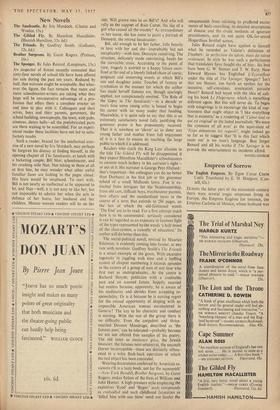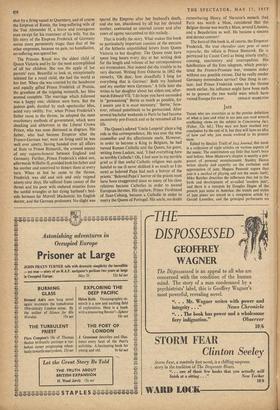Empress of Sorrow
DURING the latter part of the nineteenth century there were several tragic empresses living in Europe, the Empress Eugenie for instance, the Empress Carlotta of Mexico, whose husband was
shot by a firing squad at Queretaro, and of course the Empress of Russia, the long-suffering wife of the Tsar Alexander H, a brave and courageous man except for his treatment of his wife. Yet the life story of the Empress Frederick of Germany seems more persistently tragic than that of the other empresses, because no pain, no humiliation, no suffering was spared her.
The Princess Royal was the eldest child of Queen Victoria and by far the most accomplished of all her children. She was the apple of her parents' eyes. Beautiful to look at, exceptionally talented for a royal child, she had the world at her feet. When she was courted by the handsome and equally gifted Prince Frederick of Prussia, the grandson of the reigning monarch, her bliss seemed complete. The marriage which followed was a happy one; children were born. But the jealous gods, dazzled by such spectacular bliss, acted very swiftly. For, when Prince Frederick's father came to the throne, he adopted the most reactionary methods of government, which were shocking and abhorrent to the Liberal Crown Prince, who was soon dismissed in disgrace. His father, who had become Emperor after the Franco-German war, went on living until he was well over ninety, having handed over all affairs of State to Prince Bismarck, the avowed enemy of any rapprochement between England and Germany. Further, Prince Frederick's eldest son, afterwards Wilhelm 11, avoided both his father and his mother and contrived to thwart them at every turn. When at last he came to the throne, Frederick was old and sick and only reigned ninety-nine days. He suffered from cancer of the throat and his poor wife endured miseries from the sordid wrangles at her dying husband's bed- side between Sir Morrell Mackenzie, his English doctor, and the German professors. No slight was
spared the Empress after her husband's death, and she too, abandoned by all but her devoted mother, contracted an internal cancer and after years of agony succumbed to this malady.
That is briefly the story. What makes this book so particularly important consists of the extracts of the hitherto unpublished letters from Queen Victoria to her daughter. The Queen must have spent long hours every day at her writing desk for the length and volume of her correspondence arc tremendous. Nor indeed did she trouble to be very discreet. Writing from Osborne in 1862 she remarks, 'Oh dear, how dreadfully I long for everything that is German ! Both my husband and my mother were Germans.' A little later she writes to her daughter about her eldest son, after- wards Edward VII, 'I do hope you have succeeded in "germanising" Bertie as much as possible, for I assure you it is most necessary.' Bertie,' how- ever, refused pointblank to be germanised. After several bachelor weekends in Paris he had become excessively pro-French and so he remained all his life.
The Queen's adored 'Uncle Leopold' plays a big role in this correspondence. He was ever the wise counsellor and the affectionate uncle. However, in order to become a King in Belgium, he had turned Roman Catholic and the Queen, his guest, writing from Laeken, said, 'I find everything here so terribly Catholic ! Oh, I feel now in my terrible grief as if that awful Catholic religion was quite hateful to me (I never disliked it so much as I do now) as beloved Papa had such a horror of the priests.' Beloved Papa's' horror of the priests must have been exaggerated since so many of his close relatives became Catholics in order to ascend European thrones. His nephew, Prince Ferdinand of Saxe-Coburg, became a Catholic in order to marry the Queen of Portugal. His uncle, no doubt remembering Henry of Navarre's remark that Paris was worth a Mass, considered that the Belgian throne was worth a Mass, several Litanies, and a Benediction as well. He became a sincere and devout convert !
The hero of this book is, of course, the Emperor Frederick, the true chevalier sans peur ci sans ' reproche; the villain is Prince Bismarck. He is portrayed by Count Corti as being utterly crafty, cunning, reactionary and unscrupulous. His falsification of the Ems telegram, which precipi- tated the Franco-Prussian war, remains today without any possible excuse. Did he really render Germany tremendous service? One thing is cer- tain: had Prince Frederick come to the throne much earlier, his influence might have been such as to prevent the two world wars which have



































 Previous page
Previous page